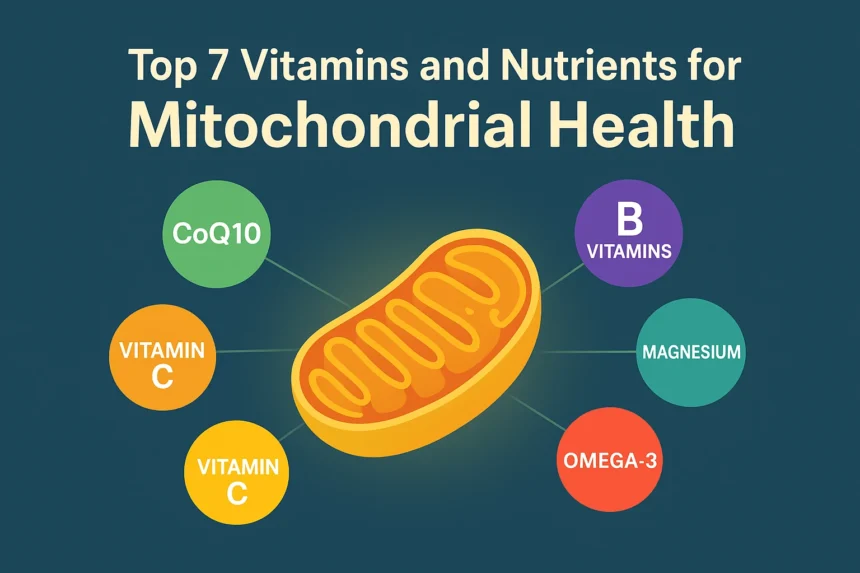Vitamins for mitochondrial health are becoming a hot topic in wellness circles. Have you ever felt drained even after a full night’s sleep? In most cases, low energy is not just about rest—it often comes down to how well your mitochondria are working. These tiny “powerhouses” of the cell convert food into usable energy. But without the right nutrients, they slow down, and so does your body.
In this article, we’ll break down the top 7 vitamins and nutrients that support mitochondrial function. You’ll learn how they help with energy, how to get them naturally, and when supplements may be a smart choice.
Top 7 Vitamins and Nutrients for Mitochondrial Function
1. Coenzyme Q10 (CoQ10)
CoQ10 is perhaps the most famous nutrient linked with mitochondrial energy.
- It helps mitochondria produce ATP (the body’s main energy currency).
- Acts as a strong antioxidant, protecting cells from oxidative stress.
👉 Tip: Natural food sources include fatty fish, organ meats, and nuts. But most people over 30 may benefit from supplements. Read my detailed Mitolyn Review to see how CoQ10 works in advanced formulas.
2. B Vitamins (B1, B2, B3, B5, B6, B12)
Each B vitamin plays a role in energy metabolism.
- B1 (Thiamine): Supports carbohydrate breakdown into energy.
- B2 (Riboflavin): Helps in electron transport for ATP production.
- B3 (Niacin): Needed for NAD+, essential in mitochondrial energy transfer.
- B12: Prevents fatigue and supports nerve health.
👉 Food sources: Whole grains, leafy greens, eggs, dairy, and lean meats.
3. Magnesium
Magnesium is like the “spark plug” for energy.
- It activates over 300 enzymes, many involved in mitochondrial function.
- Deficiency often shows up as muscle weakness, cramps, or low stamina.
👉 Food sources: Pumpkin seeds, spinach, almonds, and avocados.
4. Alpha-Lipoic Acid (ALA)
ALA works in both fat- and water-soluble environments, which makes it unique.
- Helps recycle antioxidants like vitamin C and E.
- Supports blood sugar balance and protects mitochondrial membranes.
👉 Found in spinach, broccoli, and organ meats. Supplements are often used for therapeutic benefits.
5. Vitamin C
Vitamin C is not only for immunity—it also helps mitochondria:
- Protects against free radicals.
- Supports collagen, which improves blood flow and oxygen delivery to cells.
👉 Daily fruits like oranges, kiwis, and berries keep your levels strong.
6. Vitamin D
Low vitamin D is linked to fatigue and poor mitochondrial performance.
- Supports calcium regulation inside cells.
- May improve muscle function and endurance.
👉 Sunlight exposure is the best natural source. Fatty fish and fortified foods also help.
7. Omega-3 Fatty Acids (EPA & DHA)
Omega-3s are structural components of mitochondrial membranes.
- Improve energy transfer efficiency.
- Reduce inflammation, which helps mitochondria work longer and better.
👉 Best food sources: Salmon, sardines, chia seeds, flax seeds.
How to Support Your Mitochondria Naturally
- Eat a nutrient-rich, balanced diet (focus on whole foods).
- Exercise regularly—movement boosts mitochondrial biogenesis.
- Reduce toxin exposure (like smoking, alcohol, and processed foods).
- Sleep well, since mitochondrial repair happens at night.
💡 Related Reading:
FAQs on Vitamins for Mitochondrial Health
Q1. What are the best vitamins for mitochondrial health?
The best ones include CoQ10, B vitamins, magnesium, vitamin C, vitamin D, alpha-lipoic acid, and omega-3s.
Q2. Can supplements really boost mitochondrial function?
Yes, supplements can help if you’re deficient. CoQ10 and magnesium are two commonly recommended options.
Q3. Do lifestyle habits affect mitochondrial health?
Absolutely. Exercise, diet, and sleep play key roles in keeping your mitochondria strong.
Q4. Can poor mitochondrial health cause fatigue?
Yes, since mitochondria produce cellular energy, weak function often shows up as low energy or chronic fatigue.
Q5. Is it safe to take all these vitamins together?
In most cases, yes. But it’s always best to consult a healthcare provider before starting new supplements.
Mitochondria are at the heart of your body’s energy system. By fueling them with the right vitamins and nutrients—like CoQ10, B vitamins, magnesium, and omega-3s—you can support better energy, focus, and long-term wellness.
If you’re serious about boosting your energy, start with small dietary changes and consider supplements when needed. 🌱
👉 Want to learn more? Check out our detailed supplement reviews, including Mitolyn Review, to see which formulas might work best for you.

